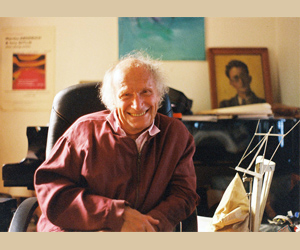Ivry Gitlis
String Instruments Competition Distinguished Jury Chairman

With Ivry Gitlis, there is no doubt about the maximum conviction of the man behind the playing. As has been said before, the violin doesn’t play itself.
Ivry Gitlis was born on August 22, 1922, in Haifa, Palestine (now Israel), to Russian parents. He received his first violin at the age of five and gave his first concert at age ten. When violinist Bronislav Huberman heard him play, he sent him to study at the Conservatoire de Paris, where, at age thirteen, he won a first prize. After graduation, he studied with Carl Flesch, Georges Enesco and Jacques Thibaud, among others – almost the same teachers under whom Henryk Szeryng studied a few years before him. After the Second World War, he made his European debut at the Royal Albert Hall. In 1951, he made his debut in Paris – which was later to become his main residence - and has since gone on to give concerts all over the world.
Gitlis was designated UNESCO Goodwill Ambassador in 1990 and has supported UNESCO by performing at various UNESCO fundraising galas for educational and cultural projects. In addition to being a violin virtuoso, he writes and composes and is the author of the autobiographical L’âme et la Corde, which was published in 1981 to critical acclaim.
His first recording, "Le Concerto à La mémoire d'un ange" (Concerto to the Memory of an Angel), Alban Berg’s violin concerto, won the Grand Prix du Disque (Grand Record Prize) in France. Subsequent recordings, many of which until their recent re-releases had become sought-after collectors’ items, have included the concertos of Paginini, Tchaikovsky, Mendelssohn, Stravinsky, Bruch, Sibelius, Wieniawski and the Bartok Concerto and Solo Sonata for which he received the Best Record of the Year award from the New York Herald Tribune.
Although less widely known as a chamber player, Ivry Gitlis has made music with a wide range of artists - Jascha Heifetz, Gregor Piatigorsky, William Primrose, Isaac Stern, Leonard Rose, Stephen Isserlis, Truls Mork, Gary Hoffman, Mischa Maisky and Martha Argerich, with whom he recorded the Franck and Debussy Sonatas.
Gitlis is also a renowned pedagogue giving master classes all over Europe and beyond, regularly spending summers at the Mozarteum in Salzburg and in France where he has created memorable festivals. In 2001 he was one of the featured commentators in Bruno Monsaingeon’s film, “The Art of the Violin”. Tony Palmer’s 2004 film on Ivry Gitlis was premiered at the Prague Spring Music Festival where it was lauded by the Oscar-winning director Andrea Anderman as "the best artist's profile I have ever seen". And, most recently, he was honored in 2004 as part of the Festival devoted to great violinists of the 20th century, at the Louvre Museum in Paris.
Based in Paris since the end of the sixties, Ivry Gitlis' immense impact on the art of violin playing and his unique personality and extraordinary interpretations, many of which can be seen or heard on YouTube are a testament to the great man and artist. The depth of his expressive powers can hardly be exaggerated. He plays the "Swan Song" Stradivarius of 1737 (the year of Stradivari’s death).





 © 2016-2017 Gershwin International Music Competition.
© 2016-2017 Gershwin International Music Competition.